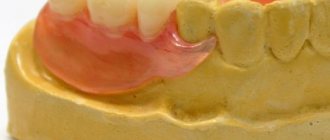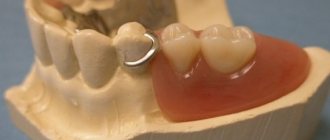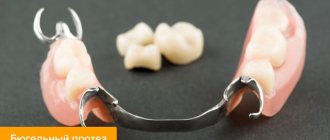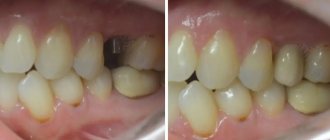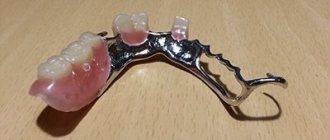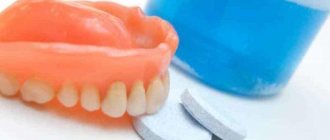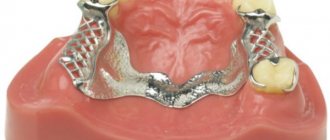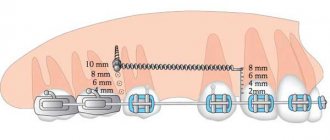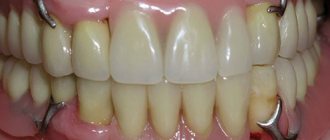Caring for dentures
- Types of structures
- Plastic dentures
- How to care at home
- How to care and store
- Nylon dentures
- Clasp dentures
- Care products
Dentures require careful care. In order for them to serve their owners for a long time, you need to learn how to carefully care for them and store them correctly. Their insufficient cleaning and non-compliance with hygiene rules often cause destruction of neighboring teeth, inflammation of the gums, and bad breath. It is also important to listen to the recommendations of the doctor, who, when installing such structures, should tell the patient how to use them correctly.
Dentures will retain their original appearance for a long time, provided:
- choosing the right cleaning product;
- maintaining daily oral hygiene;
- Visit the dentist at least twice a year for professional cleaning.
The main task of people who wear such designs is to maintain their aesthetics and durability. This can only be achieved if denture care is carried out in accordance with their type.
Features of clasp prosthetics
Clasp dentures are fundamentally different from plate dentures (acrylic, Acri-Free, nylon).
The design provides:
- The metal frame is a clasp (or arc translated from German), which unites all structural elements.
- A plastic base with a cast metal mesh inside is in contact with the gums in places where teeth are missing, and artificial crowns are attached to it.
- Fixation elements - hooks, clasps or telescopic crowns, which are responsible for holding it in the mouth and distributing the chewing load.
Thanks to the metal arc, a massive plastic base can be avoided. Therefore, compared to other types of removable dentures, clasp dentures are less massive and more comfortable. The arch also increases the strength of the prosthesis - the risk of breakage is reduced and service life is extended. This is the best type of removable dentures for partially missing teeth.
Types of structures
There are two types of dentures: removable and fixed. Nylon and acrylic models are removed and can be cleaned with running water, preferably boiled. But it is better to clean with special solutions that are effective in getting rid of bacteria. They are purchased in pharmacies in ready-made form or in tablets dissolved in water. To fix such structures, glue, cream or strips are used.
These care methods also apply to partially removable structures, which include clasp models. Fixed veneers, implants, bridges, crowns require more careful care. Dental floss is used to clean hard-to-reach areas. Interdental brushes are also effective. You need to complete the procedure of cleaning from food debris by rinsing your mouth using special products.
Prerequisites for wear
- Use of abrasives. When cleaning a denture with toothpaste with a whitening effect, scratches may appear on the structure, facilitating the accumulation of bacterial plaque on the denture.
- Inadequate maintenance of the structure. A dirty denture often becomes a prerequisite for its rapid wear and causes inflammatory processes in the oral cavity.
- When smoking, drinking coffee or strong tea, dental structures turn yellow, and a hard-to-remove brown plaque appears on them.
Plastic dentures
Rinsing after eating, cleaning with toothpaste, disinfection - these are the main rules for caring for plastic dentures.
The ideal option would be to clean them regularly after eating. If this is not possible, thorough cleaning 2 times a day is allowed. To remove plaque in hard-to-reach places, brushes and dental floss are additionally used.
Plaque is removed by washing with water, brushing with a special paste, and the procedure ends by placing the structure in an antiseptic solution. Twice a year it is necessary to take it to the dentist for professional cleaning to remove deposits and stones.
Own digital laboratory - speed and quality
Direct and instant interaction between the orthopedist and the dental technician allows us to reduce the time required for prosthetics and monitor the quality of workmanship at every stage.
- No possibility of distortion of transmitted data
- Bringing the prosthesis to ideal parameters without limiting the number of fittings
How to care at home
The products used to clean your home can achieve good results. The most important thing is to regularly care for your dentures at home. But professional cleaning should be an equally significant addition to home care.
When cleaning them at home you need to use:
- with a soft toothbrush (carefully treat areas of contact with the gums);
- non-abrasive toothpaste (you can use gentle children's toothpaste);
- tablets - indicators of bacterial plaque;
- disinfectant solutions (antiseptics, rinses containing chlorhexidine, special tablets).
Treatments using vinegar or lemon are especially popular. Frequent cleaning with vinegar is not advisable, as it negatively affects the strength of the teeth. You can use this method sometimes by placing the structure in vinegar for 2 hours.
It is safer to mix a quarter of a lemon with toothpaste or powder and apply the mixture and leave for 20 minutes. Then rinse with running water. Some people try to use baking soda, but doctors say there are no results from such cleansing, despite the prevailing opinion about its effectiveness.
Advantages
Compared to conventional plate dentures, clasp dentures have a completely different design, which sets them apart from other removable prosthetic options.
- Comfortable to wear Thanks to the reduced size of the base and the absence of massive elements, the prosthesis feels in the mouth like your own teeth
- Comfortable chewing Chewing function is completely restored, due to the metal base the prosthesis is resistant to stress, you can eat any food
- Does not impair diction The base of the design does not block the palate, and the narrow metal arch does not have any effect on diction
- Long service life With proper manufacturing, competent prosthetics and proper care, a removable clasp denture can last for 10 years
Clasp prosthetics is a worthy alternative
to implantation. If implantation is contraindicated, installation of a clasp prosthesis is the optimal solution. The presence of a metal base in the design increases the service life of 10 years, allows you to reduce the size of the prosthesis, making it more comfortable for the patient. Such a denture will never fall out of your mouth when chewing or talking.
Levin Dmitry Valerievich Chief physician and founder of the Doctor Levin center
How to care for and store dentures
In the past, when removable plastic structures were made from air-drying rubber, they were stored in an aqueous solution. Now they are made on the basis of acrylic and nylon, which do not require such storage.
Proper care and storage of dentures is an important condition for their long service life. Therefore, it is worth listening to the advice of doctors who recommend not removing them at night, especially immediately after installation, so that the person can get used to them and the articular heads of the jaws do not move. When removing them at night, they do not need to be kept in liquid; they can be left dry, wrapped in a clean napkin.
It is not recommended to remove clasp structures while sleeping, especially if you have periodontal diseases, but if you need to remove them for a short period of time, they need to be thoroughly cleaned, dried and placed in a case.
Nutrition
- When using a clasp design, for the first time after installation, while adaptation to the design occurs, you need to eat only soft food.
- You should not bite food with your front teeth. Chew food only with the help of the lateral teeth, distributing it evenly on the right and left jaws.
- When you get used to the prosthesis, you can gradually switch to your usual food, but nevertheless, for the successful functioning and durability of the clasp prosthesis, it is necessary to minimize or eliminate hard, sticky and viscous foods from the diet.
- When chewing hard food, the artificial tooth may break off and cause structural failure.
- You can train your chewing skills by eating fruits or vegetables cut into small pieces.
- Viscous and sticky food can stick to the denture and cause it to break.
Nylon dentures
To preserve the properties of nylon structures for a long time, we must not forget about special care, otherwise the loss of their aesthetics and functionality and an unpleasant odor are guaranteed.
Caring for nylon dentures involves home and professional cleaning. When cleaning the house, nylon can be scratched if you use hard brushes. Therefore, it is recommended to acquire only soft models of brushes and pastes that do not contain abrasive substances. To protect against damage, they should be put on or taken off over a sink filled with water. You can fold a terry towel in several layers and carry out these manipulations over it.
Due to the fact that this material is capable of absorbing foreign odors and being stained by drinks and food, wearers of such prostheses need to disinfect them more often. For these purposes, dental nylon liquid, cleansing tablets such as Corega or ROCS are used.
To remove bacterial plaque from them that cannot be cleaned at home, an ultrasonic bath is used. The procedure is performed by a doctor in the clinic, where he also examines the gums under the structure. Thanks to the use of ultrasound, the surface gets rid of not only bacteria, but also coloring substances (nicotine) and tartar.
Cleaning the prosthesis in the clinic
Every six months, or more often if necessary, you should visit your orthopedic dentist for a professional examination. While the examination is underway, the prosthesis will be cleaned professionally. To do this, use powerful ultrasonic baths or special devices that produce magnetic waves. They remove plaque and stone from the orthopedic structure and disinfect it. This type of care is several times better than the most thorough home care. After all, this is the only way to remove hard dental deposits, namely stone.
In the meantime, while the denture is being cleaned, the patient does not waste time - he can cure caries or pulpitis, and carry out professional hygiene of his own remaining teeth. After all, they also need to remove plaque and tartar every six months in order to maintain the beauty and health of your smile longer.
1McGeevy G. Partial removable dentures, 2006.
QUESTION ANSWER
QUESTION Hello, I have been wearing a partial denture for about 8 months. I clean it the way the dentist showed me. I even bought a special brush and paste. But recently I began to notice that a film seemed to appear inside the prosthesis, as if in spots. Even soaking doesn't help with the tablet. What to do? Tatyana Sergeevna
ANSWER Hello, Tatyana Sergeevna. We recommend that you make an appointment with your orthopedic dentist, who will help you figure out whether it is plaque and tartar on the prosthesis, ingrained dye or incorrect manufacturing (defects, bad material). Based on the diagnostic results, the doctor can use professional products to clean the prosthesis in the clinic. Or recommend being careful when eating brightly colored foods. The third option is to replace the prosthesis.
Author: Mikhailova (. M. (Thank you for your help in writing the article and the information provided)
Clasp dentures
Partially removable clasp structures are made from different materials. The most commonly used materials are cermets and plastics. Depending on the type of material, it is determined what the optimal care for clasp dentures will be.
The peculiarity of caring for them is explained by the fact that their arches are made of metal. This requires a special approach to cleaning. When an arc is made of several separate parts, the joints should not be mechanically processed to avoid darkening and staining on them. When cleaning, only use a soft brush. Otherwise, care is similar to that of other removable models. Only once a week you need to treat them in a biological solution designed to remove stubborn stains and food debris.
If home care does not give the desired effect, then professional cleaning is recommended to remove hard deposits and plaque. This needs to be done once every six months.
It is not necessary to remove the clasp structures at night, especially during the first 2 weeks.
Medical examination
At least once every six months, the patient must undergo a medical examination by a dentist.
The doctor will examine the oral cavity and, if necessary, reline the denture. During the use of the structure, atrophy of the bone tissue and mucous membrane occurs, as a result, an empty space appears under the structure and the gum, which leads to an incomplete fit of the prosthetic bed to the gum. This leads to an uneven distribution of the chewing load between the mucous membrane and the supporting teeth.
If the structure is not re-aligned in time, the supporting teeth may be lost and the prosthesis will become unusable.
If you experience complaints of burning, increased dry mouth, skin rashes and other unusual symptoms during the first time after installation of the prosthesis, you should urgently see an allergist for an allergy examination.
Care products
Modern means for caring for dentures are varied and more effective than the old-fashioned solutions with soda and potassium permanganate, which will do more harm than good. They are specially designed for different types of structures, therefore they are absolutely harmless.
Care products can be fixative or cleansing. The most popular of them are fixing adhesives and creams. They contribute to a reliable fit of the prosthesis and redistribution of the load during chewing. It prevents food debris from getting under them and does not rub the gums, since the glue creates an airtight cushion. At night, the structure with fixing substances must be removed, this is the condition for their use.
Fixing powder is suitable for people with weak salivation. A thin layer of powder is applied to the structure, which is pressed tightly against the gums, creating an obstacle to food particles. And strips of special canvas for fixation are necessary if a person has an abnormal jaw structure.
Another common remedy is special tablets that dissolve in water. This solution can not only clean dentures, but also whiten them. True, they do not work on persistent nicotine stains; you will need the help of a dentist who will remove them with ultrasound. This needs to be done every six months.
Rinsing, cleaning, disinfection, professional care - these are the main components of the care process. And what means are used for them will depend on the specific model of prostheses.
Overnight storage
Previously, there was an opinion that dentures must be stored in a glass of water. This is wrong. Yes, a humid environment is important for the device. But only at the initial stage of wear, which lasts about several months. The thing is that fresh plastic can acquire a marbled appearance in the air due to the process of passing monomers. The aquatic environment eliminates the occurrence of such a defect. The same moist environment exists in the oral cavity. Therefore, it is enough to simply wear the prosthesis all the time and, if desired, remove it at night.
Modern dentures can be stored in a box specially designed for this purpose. The product can be wrapped in a cotton rag.


